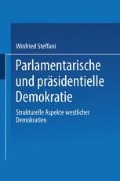Zusammenfassung
Kein anderes Staatsorgan steht so sehr im Zentrum des politischen Gestaltungsprozesses eines demokratischen Regierungssystems wie das Parlament. Ein volles Verständnis seiner Rolle im Regierungssystem, seiner Organisation, Befugnisse, Zusammensetzung, Arbeitsweisen und politischen Machtstellung kann nur gewonnen werden, wenn es aus dem Gesamtzusammenhang des bestehenden Herrschaftssystems her analysiert wird. Ein derartiges System ist stets ein äußerst komplexes, kompliziertes und dynamisches Phänomen. Die Analyse eines Parlaments erfordert daher eine umfassende und eïngeende Untersuchung. Das Problem wächst, wenn die Parlamente zweier verschiedener Systeme miteinander verglichen werden sollen.
Access this chapter
Tax calculation will be finalised at checkout
Purchases are for personal use only
Preview
Unable to display preview. Download preview PDF.
Literatur
Siehe hierzu, mit anderer thematischer Akzentsetzung, auch Winfried Steffani „Funktion und Arbeitsweise der Fraktionen im amerikanischen Kongreß und Deutschen Bundestag — Eine vergleichende Betrachtung“, in: Gegenwartskunde, Heft 2, 1969, S. 125-137.
Vgl. Lewis Deschler: Constitution, Jefferson’s Manual and Rules of the House of Representatives, Washington 1963, S. VI.
Jetzt ist auf die sogen. „kleine Parlamentsform“ vom Jahre 1969, die im wes:ntlichen eine Geschäftsordnungsreform darstellt, zu verweisen. Dazu Uwe Thaysen: Parlamentsreform in Theorie und Praxis, Opladen 1972.
So David B. Truman: The Congressional Party — A Case Study, New York 1959, S. VI.
Näheres hierzu auch unten S. 333.
Burke, “the most eloquent advocate of party loyalty”. F. W. Raffety in der Einleitung zu “The Works of… Edmund Burke”. Ausgabe: World’s Classics, London 1906, Bd. Il, S. XI.
Edmund Burke “’Thoughts of the Cause of the Present Discontents, 1770”, zitiert nach “The Works of…”, London 1906, Bd. II, S. 84.
A. Lawrence Lowell “The Influence of Party upon Legislation in England and America”, in Annual Report of the American Historical Association for the Year 1901, Washington 1902, Bd. I, S. 319 ff, bes. S. 343 ff.
Vg. hierzu vor allem Morton Grodzins “American Political Parties and the American System”, in: The Western Political Quarterly, Bd. XIII, Dezember 1960, S. 974-998, bes. S. 998.
Julius Turner: Party and Constituency — Pressures on Congress, Baltimore 1951, S. 34 f, 2. erweiterte Auflage 1970.
Allen M. Potter: American Government and Politics, London 1955, S. 170 f.
Lewis A. Froman: Congressmen and their Constituencies, Chicage 1963, S. 5 u. 7.
Zu diesen Begriffen siehe oben S. 92 ff.
Siehe hierzu auch die kontrovers geführte Diskussion von Claus Arndt und Winfried Steffani „Zum Rederecht der Mitglieder des Bundesrates im Bundestag“, in: Zeitschrift für Parlamentsfragen, Heft 3, Sept. 1976, S. 317-328.
Lyndon B. Johnson “My Political Philosophy”, in: The Texas Quarterly, Bd. I, Winter 1958, S. 17-22.
Ebd. S. 18 f.
Ebd. S. 22.
Potter a.a.O. S. 171.
Zur neueren Entwicklung jetzt Jürgen Hartmann: Der amerikanische Präsident im Bezugsfeld der Kongreßfraktionen, Berlin 1977, mit wertvollem Literaturverzeichnis.
Dazu näheres oben S. 175 ff.
Siehe hierzu Thomas J. Carbery “Views and Opinions — The Americanisation of British Politics”, in: The Journal of Politics, Bd. 27, Nr. 1, Februar 1965, S. 179 ff und S. A. Walkland “Science and Parliament: The Role of the Select Committees of the House of Commons”, in: Parliamentary Affairs, Bd. 18, Nr. 3, Sommer 1965, S. 266-278, bes. S. 277 f.
Author information
Authors and Affiliations
Rights and permissions
Copyright information
© 1979 Springer Fachmedien Wiesbaden
About this chapter
Cite this chapter
Steffani, W. (1979). Amerikanischer Kongreß und Deutscher Bundestag — ein Vergleich. In: Parlamentarische und präsidentielle Demokratie. VS Verlag für Sozialwissenschaften, Wiesbaden. https://doi.org/10.1007/978-3-663-14351-2_14
Download citation
DOI: https://doi.org/10.1007/978-3-663-14351-2_14
Publisher Name: VS Verlag für Sozialwissenschaften, Wiesbaden
Print ISBN: 978-3-531-11476-7
Online ISBN: 978-3-663-14351-2
eBook Packages: Springer Book Archive

